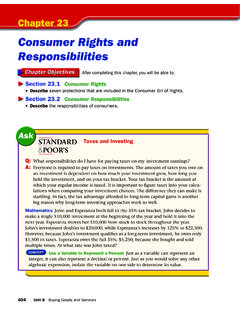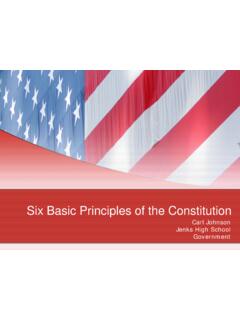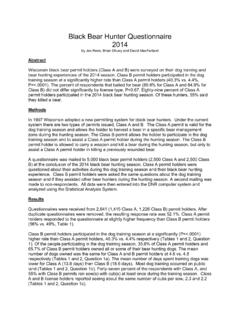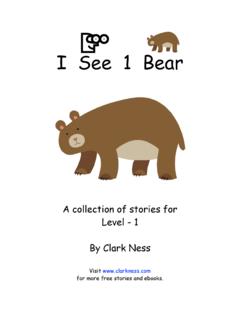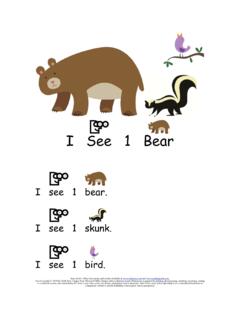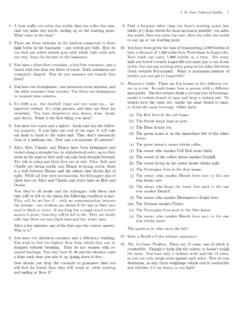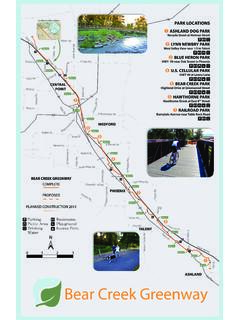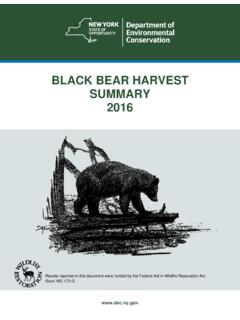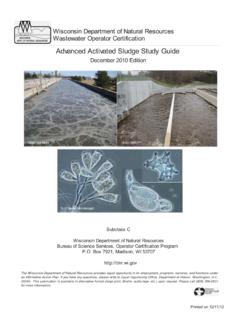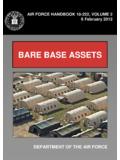Transcription of William Faulkner “The Bear” (1942) chief, depart on the ...
1 William Faulkner The bear (1942)He was ten. But it had already begun, long before that day when at last he wrote his age in two figures and he saw for the first time the camp where his father and Major de Spain and old General Compson and the others spent two weeks each November and two weeks again each June. He had already inherited then, without ever having seen it, the tremendous bear with one trap-ruined foot which, in an area almost a hundred miles deep, had earned itself a name, a definite designation like a living man. He had listened to it for years: the long legend of corncribs rifled, of shotes and grown pigs and even calves carried bodily into the woods and devoured, of traps and deadfalls overthrown and dogs mangled and slain, and shotgun and even rifle charges delivered at point-blank range and with no more effect than so many peas blown through a tube by a boy a corridor of wreckage and destruction beginning back before he was born, through which sped, not fast but rather with the ruthless and irresistible deliberation of a locomotive, the shaggy tremendous shape.
2 It ran in his knowledge before he ever saw it. It looked and towered in his dreams before he even saw the unaxed woods where it left its crooked print, shaggy, huge, red-eyed, not malevolent but just big too big for the dogs which tried to bay it, for the horses which tried to ride it down, for the men and the bullets they fired into it, too big for the very country which was its constricting scope. He seemed to see it entire with a child s complete divination before he ever laid eyes on either the doomed wilderness whose edges were being constantly and punily gnawed at by men with axes and plows who feared it because it was wilderness, men myriad and nameless even to one another in the land where the old bear had earned a name, through which ran not even a mortal animal but an anachronism,1 indomitable2 and invincible, out of an old dead time, a phantom, epitome and apotheosis3 of the old wild life at which the puny humans swarmed and hacked in a fury of abhorrence and fear, like pygmies about the ankles of a drowsing elephant: the old bear solitary, indomitable and alone, widowered, childless, and absolved of mortality old Priam4 reft of his old wife and having outlived all his sons.
3 Until he was ten, each November he would watch the wagon containing the dogs and the bedding and food and guns and his father and Tennie s Jim, the Negro, and Sam Fathers, the Indian, son of a slave woman and a Chickasaw chief, depart on the road to town, to Jefferson, where Major de Spain and the others would join them. To the boy, at seven, eight, and nine, they were not going into the Big Bottom to hunt bear and deer, but to keep yearly rendezvous with the bear which they did not even intend to kill. Two weeks later they would return, with no trophy, no head and skin. He had not expected it. He had not even been afraid it would be in the wagon. He believed that even after he was ten and his father would let him go too, for those two weeks in November, he would merely make another one, along with his father and Major de Spain and General Compson and the others, the dogs which feared to bay at it and the rifles and shotguns which failed even to bleed it, in the yearly pageant of the old bear s furious immortality.
4 Then he heard the dogs. It was in the second week of his first time in the camp. He stood with Sam Fathers against a big oak [506] beside the faint crossing where they had stood each dawn for nine days now, hearing the dogs. He had heard them once before, one morning last week a murmur, sourceless, echoing through the wet woods, swelling presently into separate voices which he could recognize and call by name. He had raised and cocked his gun as Sam told him and stood motionless again while the uproar, the invisible course, swept up and past and faded; it seemed to him that he could actually see the deer, the buck, blond, smoke-colored, elongated with speed, fleeing, vanishing, the woods, the gray solitude, still ringing even when the cries of the dogs had died away. Now let the hammers down, Sam said. You knew they were not coming here too, he said. Yes, Sam said. I want you to learn how to do when you didn t shoot. It s after the chance for the bear or the deer has done already come and gone that men and dogs get killed.
5 Anyway, he said, it was just a deer. Then on the tenth morning he heard the dogs again. And he readied the too-long, [507] too-heavy gun as Sam had taught him, before Sam even spoke. But this time it was no deer, no ringing chorus of dogs running strong on a free scent, but a moiling5 yapping an octave too high, with something more than indecision and even abjectness in it, not even moving very fast, taking a long time to pass completely out of hearing, leaving then somewhere in the air that echo, thin, slightly hysterical, abject, almost grieving, with no sense of a fleeing, unseen, smoke-colored, grass-eating shape ahead of it, and Sam, who had taught him first of all to cock the gun 1and take position where he could see everywhere and then never move again, had himself moved up beside him; he could hear Sam breathing at his shoulder, and he could see the arched curve of the old man s inhaling nostrils. Hah, Sam said. Not even running.
6 Walking. Old Ben! the boy said. But up here! he cried. Way up here! He do it every year, Sam said. Once. Maybe to see who in camp this time, if he can shoot or not. Whether we got the dog yet that can bay and hold him. He ll take them to the river, then he ll send them back home. We may as well go back too; see how they look when they come back to camp. When they reached the camp the hounds were already there, ten of them crouching back under the kitchen, the boy and Sam squatting to peer back into the obscurity where they had huddled, quiet, the eyes luminous, glowing at them and vanishing, and no sound, only that effluvium6 of something more than dog, stronger than dog and not just animal, just beast, because still there had been nothing in front of that abject and almost painful yapping save the solitude, the wilderness, so that when the eleventh hound came in at noon and with all the others watching even Old Uncle Ash, who called himself first a cook Sam daubed the tattered ear and the raked shoulder with turpentine and axle grease, to the boy, it was still no living creature, but the wilderness which, leaning for the moment down, had patted lightly once the hound s temerity.
7 Just like a man, Sam said. Just like folks. Put off as long as she could having to be brave, knowing all the time that sooner or later she would have to be brave to keep on living with herself, and knowing all the time beforehand what was going to happen to her when she done it. That afternoon, himself on the one-eyed wagon mule which did not mind the smell of blood nor, as they told him, of bear , and with Sam on the other one, they rode for more than three hours through the rapid, shortening winter day. They followed no path, no trail even that he could see; almost at once they were in a country which he had never seen before. Then he knew why Sam had made him ride the mule which would not spook. The sound one stopped short and tried to whirl and bolt even as Sam got down, blowing its breath, jerking and wrenching at the rein, while Sam held it, coaxing it forward with his voice, since he could not risk tying it, drawing it forward while the boy got down from the marred one.
8 Then, standing beside Sam in the gloom of the dying afternoon, he looked down at the rotted overturned log, gutted and scored with claw marks and, in the wet earth beside it, the print of the enormous warped two-toed foot. He knew now what he had smelled when he peered under the kitchen where the dogs huddled. He realized for the first time that the bear which had run in his listening and loomed in his dreams since before he could remember to the contrary, and which, therefore, must have existed in the listening and dreams of his father and Major de Spain and even old General Compson, too, before they began to remember in their turn, was a mortal animal, and that if they had departed for the [508] camp each November without any actual hope of bringing its trophy back, it was not because it could not be slain, but because so far they had had no actual hope to. Tomorrow, he said. We ll try tomorrow, Sam said. We ain t got the dog yet.
9 We ve got eleven. They ran him this morning. It won t need but one, Sam said. He ain t here. Maybe he ain t nowhere. The only other way will be for him to run by accident over somebody that has a gun. That wouldn t be me, the boy said. It will be Walter or Major or It might, Sam said. You watch close in the morning. Because he s smart. That s how come he has lived this long. If he gets hemmed up and has to pick out somebody to run over, he will pick out you. How? the boy said. How will he know He ceased. You mean he already knows me, that I ain t never been here before, ain t had time to find out yet whether I He ceased again, looking at Sam, the old man whose face revealed nothing until it smiled. He said humbly, not even amazed, It was me he was watching. I don t reckon he did need to come but once. The next morning they left the camp three hours before daylight. They rode this time because it was too far to walk, even the dogs in the wagon; again the first gray light found him in a place which he had never seen before, where Sam had placed him and told him to stay and then departed.
10 With the gun which was too big for him, which did not even belong to him, but to Major de Spain, and which he had fired only once at a stump on the first day, to learn the recoil and how to reload it he stood against a gum tree beside a little bayou whose black still water crept without movement out of a canebrake7 and crossed a small clearing and into cane again, 2where invisible, a bird the big woodpecker called Lord-to-God by Negroes clattered at a dead limb. It was a stand like any other, dissimilar only in incidentals to the one where he had stood each morning for ten days; a territory new to him, yet no less familiar than that other one which, after almost two weeks, he had come to believe he knew a little the same solitude, the same loneliness through which human beings had merely passed without altering it, leaving no mark, no scar, which looked exactly as it must have looked when the first ancestor of Sam Fathers Chickasaw predecessors crept into it and looked about, club or stone ax or bone arrow drawn and poised; different only because, squatting at the edge of the kitchen, he smelled the hounds huddled and cringing beneath it and saw the raked ear and shoulder of the one who, Sam said, had had to be brave in order to live with herself, and saw yesterday in the earth beside the gutted log the print of the living foot.



